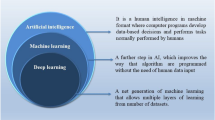Abstract
The digitalization of biology and medicine is producing an exponential amount of data. Combined with the emergence of new analytical AI tools, unprecedented opportunities to accelerate medical progress are emerging. Today, two major areas are about to undergo a profound transformation: medical and pharmaceutical research as well as clinical practice from diagnosis to therapeutic management. Can AI help in the discovery and development of better drugs?
Access this chapter
Tax calculation will be finalised at checkout
Purchases are for personal use only
Similar content being viewed by others
Notes
- 1.
Krizhevsky A., Sutskever I., Hinton G.E., “Imagenet classification with deep convolutional neural networks,” Advances in Neural Information Processing Systems, 2012, 1097–1105.
- 2.
Serendipity is the act of making a scientific discovery or technological invention unexpectedly as a result of a combination of chance circumstances and very often in the context of research on another subject.
- 3.
Courtiol, P., Maussion, C., Moarii, M. et al. Deep learning-based classification of mesothelioma improves prediction of patient outcome. Nat Med 25, 1519–1525 (2019). https://doi.org/10.1038/s41591-019-0583-3
- 4.
Mobadersany P., Yousefi S., Amgad M., Gutman D.A., Barnholtz-Sloan J.S., Vega J.E.V., Cooper L.A., “Predicting cancer outcomes from histology and genomics using convolutional networks,” Proceedings of the National Academy of Sciences, 2018, 201717139.
- 5.
Absorption, distribution, metabolism, excretion.
- 6.
Author information
Authors and Affiliations
Corresponding author
Editor information
Editors and Affiliations
Rights and permissions
Copyright information
© 2020 Springer Nature Switzerland AG
About this chapter
Cite this chapter
Wainrib, G. (2020). Artificial Intelligence for Medical and Pharmaceutical Research: Can Artificial Intelligence Help in the Discovery and Development of New Drugs?. In: Nordlinger, B., Villani, C., Rus, D. (eds) Healthcare and Artificial Intelligence. Springer, Cham. https://doi.org/10.1007/978-3-030-32161-1_26
Download citation
DOI: https://doi.org/10.1007/978-3-030-32161-1_26
Published:
Publisher Name: Springer, Cham
Print ISBN: 978-3-030-32160-4
Online ISBN: 978-3-030-32161-1
eBook Packages: Intelligent Technologies and RoboticsIntelligent Technologies and Robotics (R0)




